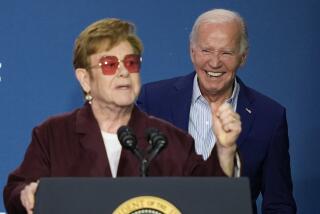For LGBT community, Orlando shooting is a painful reminder of the dangers they face
- Share via
For LGBT community, Orlando shooting is a painful reminder of the dangers they face
Hundreds came to New York’s famed Stonewall Inn on Sunday evening to show solidarity with the victims of the shooting in Orlando, Fla. There was a heavy police presence, including several bomb-sniffing dogs and anti-terrorism police with assault rifles.
“We are a community that will never be silenced again. I ask every one of you to think of a person you lost because of anti-LGBT hate,” said Ken Kidd, one of the original organizers of ACT UP, one of the first organizations to push for LGBT rights. “I want every one of you to remember a time you felt unsafe. I want every one of you to think about how to make things better.”
At one point, a woman who identified herself as a gay Muslim was heckled by an older white man, but the crowd booed him and he was escorted away by police.
Dakota Nieves and Indiana Baker, both 16, said they were afraid in a new way after Sunday’s shooting. Nieves identifies as transgender and uses the pronouns “he” and “him;” Baker identifies as agender and uses the pronouns “they” and “them.”
The two friends lit a candle at a small makeshift memorial outside Stonewall, which the Obama administration recently said it would make a national landmark.
“I’m scared, I thought this country was headed toward something better,” Baker said. “It was like someone punched me in the stomach.”
“I felt forced back into the closet,” Nieves said. “I came out in sixth grade, and I felt so assured of myself. And then on the train today I thought maybe I should feel scared again.”
Quincy Bell, 34, a health educator from Tampa, Fla., had been to the club where the shooting took place many times. He was at the Stonewall Inn with his friend Cecil Wilder, 31.
“I was catatonic when I found out,” Bell said. “I talked to friends. I cried uncontrollably and I had to turn off the TV and come out and be here. This gives me strength. The solidarity. It means I’m not crying in front of my TV. Sometimes you have to get up and do it.”
Bell, who is black, noted that most of the people at the club were people of color. “As a gay person and a man of color, there’s always a sense of fear living your truth,” he said. “The fear is always there.”
“It could happen to any of us,” Michael Kerr, 52, said. “I go places all the time and feel fear. It makes me think twice about going out. I’m not going to go to clubs on Friday or Saturday. There’s times you don’t feel safe. I still have to be careful. What I really think we need to do is address guns.”
—Peter Moskowitz
Latest updates
More to Read
Sign up for Essential California
The most important California stories and recommendations in your inbox every morning.
You may occasionally receive promotional content from the Los Angeles Times.













